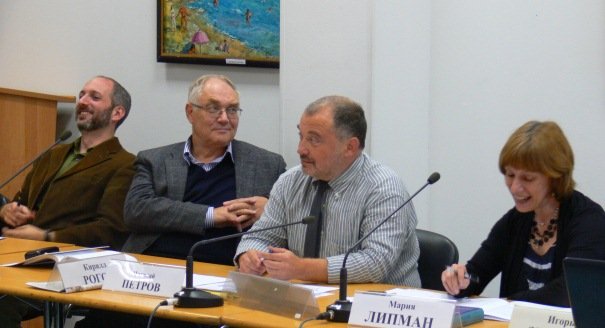Registration
You will receive an email confirming your registration.
IMGXYZ3953IMGZYXCurrent political trends could have a significant impact on Russia’s future development. Russia in 2020: Scenarios for the Future, a book recently published in Russian by the Carnegie Moscow Center and ROSSPEN and earlier published in English by the Carnegie Foundation for International Peace, analyzes the potential impact of these trends. The Carnegie Moscow Center hosted number of the book’s contributors for a presentation of the Russian edition of the book, including Igor Zevelev of the MacArthur Foundation’s Moscow office, Lev Gudkov of the Levada Center, Sam Greene of the Center for the Study of New Media and Society at the New Economic School in Moscow, and Alexey Sidorenko of the “Social Technologies Greenhouse” project. Boris Dubin of the Levada Center, Sergei Medvedev of the Higher School of Economics, and Boris Grozovsky of the Russian edition of Forbes provided comments. Carnegie’s Maria Lipman and Nikolay Petrov, both of whom edited the book, moderated.
Russia in 2020 Project
Lipman and Petrov explained that the book is a result of lengthy collaboration from a project headed by the Carnegie Moscow Center of the same name.
- About the Project: Lipman explained that a 30-member international expert team, formed in 2010, has been working on creating scenarios predicting Russian development through 2020. Experts considered different themes, including the country’s political system, economics, and its global influence. For the most part, a Russian expert was paired with an international expert for each theme, to provide a more comprehensive understanding. Then participants developed joint scenario analyses.
- Why 2020? Petrov provided two explanations for the scenarios’ timeframe. When the project was launched in 2010, the year 2020 seemed far removed from the upcoming 2011 and 2012 elections, so the experts would not become captive to the trends of the political moment, he said. At the same time, the date was close enough to the present day so that the scenarios would not seem overly utopian.
- Project’s Goals: The project’s goal was not only to look into the future but also understand the present, Lipman stated. Petrov added that the final scenarios attempt to both describe the present and predict what may come out of it. He explained that experts tried to determine how the country’s development would look if current trends continue. According to Dubin, the authors did not attempt to simply divine the future; they answered the question of what is to be done under one or another possible scenario.
- Scenarios: Petrov presented three main scenarios developed by the book’s authors.
- “Early Putin” or “Putin the Reformer”: Political modernization managed from above.
- “Perestroika-2”: A regime-initiated transformation that soon gets out of control and develops on its own terms.
- “Stalin-lite”: An attempt to crack down and move toward strong authoritarianism.
- “Brezhnev Plus”: Despite the authors’ belief in the inevitability of system change, the system’s resources may prove quite formidable, Medvedev added. He suggested that a fourth scenario, which, in his opinion, may also be found in the book, is most likely. In this scenario, the system stagnates.
- “Early Putin” or “Putin the Reformer”: Political modernization managed from above.
- Scenario Malfunctions: Lipman described a number of possible scenario malfunctions—unexpected events that could affect the country’s development which is depicted in the scenarios. Such malfunctions would include a drop in raw material prices, the disappearance of Putin as the supreme arbiter, destabilization in neighboring countries, a weakening or disintegration of central power, schism in the elite, destabilization in Moscow, new war in the Caucasus, turn to nationalism, turn to Europe, and civic activists’ uncontrolled unrest. Also, mentioning elections as a possible scenario malfunction, Lipman alluded to the concept proposed by Henry Hale—another author of the book—according to which elections are a particularly weak spot for regimes similar to Russian. The rapid growth of information technology could disrupt the scenarios as well, she added.
Elites, Society, and Civic Activism
- Ineffective Institutions and Elites: According to Grozovsky, the term “institutional trap,” discussed in the book by Vladimir Gelman and Petrov, most aptly describes the current situation in Russia. It refers to the extremely ineffective role political institutions play in the country’s development. Yet despite their inefficiency, these institutions are able to sustain themselves, since their survival is in the interest of the political elites.
- “Aggressive Immobility”: Greene explained that he came up with the term “aggressive immobility” as a counterbalance to the notion of Russian passivity. Greene argued that, after the collapse of the USSR more than twenty years ago, society learned to survive in chaos and an absence of functional institutions. This society cannot be called passive. Russian people clearly know where their interests lie; they can defend their positions and oppose any attempts to change the existing state of things, Greene added.
- Weak Societal Change Potential: Gudkov noted that protests were not an engine for change, but rather that they merely identified existing societal rifts. Protestors comprise only one percent of the country’s population, while the vast majority of the population subscribe to conservative, anti-modernization, and anti-Western views, he said. It is this population block that serves as Vladimir Putin’s base: Putin personifies conservatism to them, he explained.
- Parties: Gudkov claimed that Russia has no Western-style parties, and their potential emergence is thwarted by the regime. The opposition’s weakness lies in its inability to create such structures.
- Society and the Internet: Today, public activism in Russia is well represented online; however, there is danger of a crackdown in this sphere, Sidorenko pointed out. He suggested that in the future the world is likely to see more “communicatively isolated” places. He believed that when it comes to possible Internet regulation, Russia might opt for either the North Korean or Chinese alternative.
